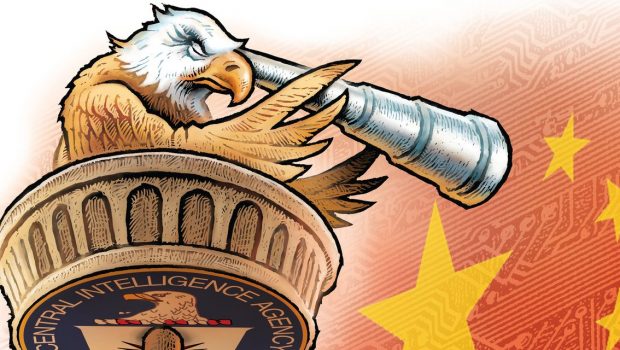China Will Soon Lead the U.S. in Tech
Central Intelligence Agency Director
Bill Burns
announced in October that the agency is establishing two new major “mission centers,” one focusing on China and the other on frontier technologies. This action reflects his judgment that China is the “most important geopolitical threat we face in the 21st century” and that the “main arena for competition and rivalry” between China and the U.S. will be advanced technologies. The question Americans should be asking is: Could China win the technology race?
A new report on the “Great Technological Rivalry” from Harvard’s Belfer Center answers: Yes. The report isn’t alarmist but nonetheless concludes that China has made such extraordinary leaps that it is now a full-spectrum peer competitor. In each of the foundational technologies of the 21st century—artificial intelligence, semiconductors, 5G wireless, quantum information science, biotechnology and green energy—China could soon be the global leader. In some areas, it is already No. 1.
WSJ Opinion: A Talk With Eric Schmidt on AI and the Human Future
Join WSJ Opinion’s Paul Gigot and the former executive chairman of Google for a discussion on the technology’s effect on society
Online on Tuesday, December 14 at 7:00 PM ET
Register Now
Last year China produced 50% of the world’s computers and mobile phones; the U.S. produced only 6%. China produces 70 solar panels for each one produced in the U.S., sells four times the number of electric vehicles, and has nine times as many 5G base stations, with network speeds five times as fast as American equivalents.
In the advanced technology likely to have the greatest effect on economics and security in the coming decade—artificial intelligence—China is ahead of the U.S. in crucial areas. A spring 2021 report from the National Security Commission on AI warned that China is poised to overtake the U.S. as the global leader in AI by 2030. U.S.-born students are earning roughly as many doctorates each year in AI-related fields as in 1990, while China is on track to graduate twice as many science, technology engineering and mathematics Ph.D.s as the U.S. by 2025. The Harvard report adds that China now clearly tops the U.S. in practical AI applications, including facial recognition, voice recognition and fintech.
The U.S. still has a dominant position in the semiconductor industry, which it has held for almost half a century. But China may soon catch up in two important arenas: semiconductor fabrication and chip design. China’s production of semiconductors has surpassed America’s, with its share of global production rising to 15% from less than 1% in 1990, while the U.S. share has fallen from 37% to 12%.
In 5G, the Pentagon’s Defense Innovation Board reports that China is on track to replicate the economic and military advantages America gained from being the global leader in 4G. China has installed 950,000 base stations to America’s 100,000. By the end of last year, 150 million Chinese were using 5G mobile phones with average speeds of 300 megabits a second, while only six million Americans had access to 5G with speeds of 60 megabits a second. America’s 5G service providers have put more focus on advertising their capabilities than on building infrastructure.
The Chinese Communist Party has made no secret of its ambitions: China intends to become the global leader in the technologies that will shape the decades ahead. The party’s 2013 economic reform plan highlighted technological innovation as the way to avoid the trap of getting stuck as a middle-income country. The celebrated “Made in China 2025” program aims to dominate domestic production of 10 emerging technologies, including 5G, AI and electric vehicles.
China also plans to extend its lead in robotics to sustain its position as the manufacturing workshop of the world. In May,
Xi Jinping
clearly stated his judgment that “technological innovation has become the main battleground of the global playing field, and competition for tech dominance will grow unprecedentedly fierce.” It is striking how successful China has been in meeting its ambitious technology targets.
In sum, although the U.S. remains the global leader in many important races, including aeronautics, medicine and nanotechnology, China has emerged as a serious competitor. Fortunately, Americans are beginning to wake up to this reality. In June the Senate passed the Innovation and Competition Act with bipartisan support, authorizing $250 billion of investment in science and technology over the next five years. Unfortunately, that legislation has stalled in the House and faces an uncertain future as part of the annual defense bill.
More recent congressional spending proposals, such as the $1.2 trillion infrastructure bill and the $1.7 trillion social-spending package, have included investments in research and development in areas like green technologies and energy storage. While these investments are greatly needed, it will take more attention and investment in strategic technologies to compete with China. Unless the U.S. can organize a national response analogous to the mobilization that created the technologies that won World War II, China could soon dominate the technologies of the future and the opportunities they will create.
Mr. Allison, a professor of government at Harvard, is author of “Destined for War: Can America and China Escape
Thucydides’s
Trap?” (2017). Mr. Schmidt was CEO of Google, 2001-11 and executive chairman of Google and its successor,
Alphabet Inc.,
2011-17 and is a co-author of “The Age of AI: And Our Human Future,” (2021).
Copyright ©2021 Dow Jones & Company, Inc. All Rights Reserved. 87990cbe856818d5eddac44c7b1cdeb8








Gloss